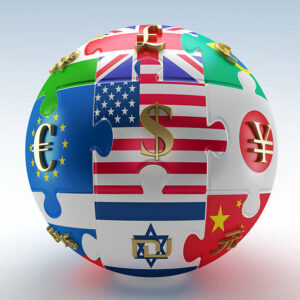The global economy is constantly evolving, driven by technological advancements, geopolitical shifts, and changing consumer preferences. These developments have a profound impact on international trade and foreign markets. In this article, we will explore five current developments in the foreign market that are shaping the landscape of international business.
1. Digital Transformation and E-commerce
 (Photo from iStock)
(Photo from iStock)
According to Statista, global e-commerce sales reached $4.28 trillion in 2020, and this number is projected to continue growing. The COVID-19 pandemic accelerated the adoption of online shopping, and consumers are now more comfortable buying products from foreign countries. Businesses that adapt to the digital marketplace can tap into this vast customer base.
In addition to traditional e-commerce, new models like cross-border e-commerce and direct-to-consumer (DTC) sales are emerging. Cross-border e-commerce allows businesses to reach international customers more easily, and DTC models enable companies to bypass traditional distribution channels, selling directly to consumers worldwide.
The impact of this development on foreign markets is substantial. It opens up opportunities for businesses of all sizes to expand their global reach. However, it also poses challenges, such as navigating complex international regulations, customs, and taxation. Successful foreign market entry in the digital age requires careful planning and a deep understanding of local consumer preferences and regulations.
2. Geopolitical Shifts and Trade Wars
 (Photo from iStock)
(Photo from iStock)
Geopolitical developments have a significant impact on foreign markets. The past few years have witnessed trade tensions and disputes between major economies, particularly the United States and China. These trade wars have led to tariffs and trade barriers, disrupting global supply chains and affecting businesses operating in foreign markets.
The COVID-19 pandemic further strained international relations, with countries implementing export restrictions on critical medical supplies and vaccines. These events highlight the importance of understanding the geopolitical landscape when engaging in foreign trade.
In response to these developments, many businesses have been revaluating their global supply chain strategies. Diversifying suppliers, reshoring production, and exploring alternative markets have become strategies to mitigate risks associated with geopolitical tensions.
Another notable development is the Regional Comprehensive Economic Partnership (RCEP), which was signed in November 2020. This trade agreement involves 15 Asia-Pacific countries, including China, Japan, and South Korea. It aims to reduce trade barriers and promote economic integration in the region. The RCEP agreement is a significant shift in global trade dynamics, potentially creating new opportunities for businesses operating in the Asia-Pacific region.
3. Sustainable and Ethical Business Practices
 (Photo from iStock)
(Photo from iStock)
Sustainability and ethical considerations are playing an increasingly important role in foreign markets. Consumers are becoming more conscious of the environmental and social impact of their purchases. Businesses that adopt sustainable practices and demonstrate a commitment to ethical standards are gaining a competitive edge in the international market.
Sustainability initiatives, such as reducing carbon emissions, using renewable energy sources, and implementing eco-friendly packaging, are becoming standard practices for many multinational corporations. In the foreign market, companies are also expected to adhere to international environmental and labour standards.
Sustainable and ethical practices are not only important for brand reputation but can also lead to cost savings and access to new markets. For example, the European Union has introduced the European Green Deal, which aims to make the EU carbon-neutral by 2050. Businesses that want to access the EU market will need to align with these sustainability goals.
4. Technological Advancements in Cross-Border Payments
 (Photo from iStock)
(Photo from iStock)
The way we make international payments is evolving rapidly, and this is a critical development in foreign markets. Traditional cross-border payments are often slow and costly due to the involvement of multiple banks and intermediaries. However, technological advancements are making cross-border transactions more efficient and cost-effective.
One notable development is the use of blockchain and cryptocurrencies for cross-border payments. Cryptocurrencies like Bitcoin and Ethereum offer the potential for faster and cheaper international transactions. They also enable businesses to circumvent traditional banking systems, which can be particularly valuable in countries with limited access to banking services.
Furthermore, financial technology (FinTech) companies are offering innovative solutions for international payments. Services like TransferWise (now known as Wise) and Revolut allow individuals and businesses to send money across borders with lower fees and competitive exchange rates. These platforms have gained popularity and are changing the landscape of international money transfers.
The development of central bank digital currencies (CBDCs) is another significant trend in cross-border payments. Several countries, including China, are developing digital versions of their national currencies. CBDCs could simplify international transactions, reduce reliance on traditional banking systems, and offer more transparency and security in cross-border payments.
5. Changes in Consumer Behaviour and Preferences
 (Photo from iStock)
(Photo from iStock)
Consumer behaviour is continually evolving, and these changes have a profound impact on foreign markets. Understanding the preferences and needs of consumers in foreign countries is crucial for the success of any international business.
One significant development is the rise of conscious consumerism. Consumers are increasingly looking for products and brands that align with their values, whether that involves supporting sustainability, ethical sourcing, or cultural sensitivity. Businesses need to adapt their marketing and product offerings to meet these evolving demands.
Moreover, the growth of the middle class in emerging economies has led to changes in consumption patterns. As disposable incomes rise, consumers in these countries are demanding higher-quality products and services, and they are willing to pay a premium for them. This creates opportunities for businesses that can cater to the needs of these expanding consumer bases.
Conclusion
The foreign market is in a state of constant evolution, driven by digital transformation, geopolitical shifts, sustainability considerations, technological advancements in payments, and changing consumer behaviour. Businesses looking to succeed in foreign markets must be agile and adaptive to these developments.
To thrive in the international arena, businesses need to stay informed about these trends, conduct thorough market research, and develop strategies that address the unique challenges and opportunities presented by foreign markets. By embracing these developments and tailoring their approaches, companies can position themselves for success in the global economy.
Reference:
Forbes
Your little friend needs a toy, confused between what to choose?, what are you waiting for click on the link below:
How to choose right dog toy on your own




